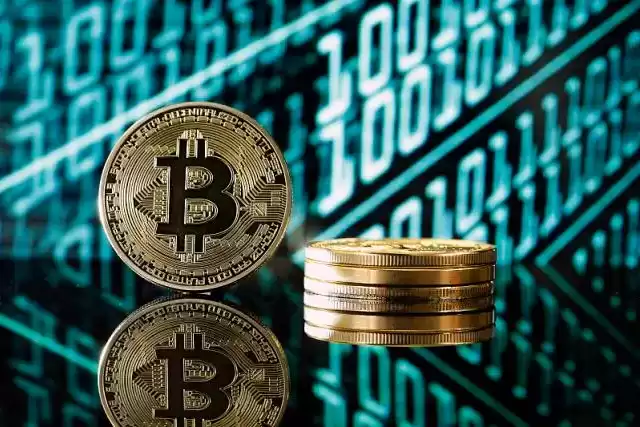-
 bitcoin
bitcoin $87959.907984 USD
1.34% -
 ethereum
ethereum $2920.497338 USD
3.04% -
 tether
tether $0.999775 USD
0.00% -
 xrp
xrp $2.237324 USD
8.12% -
 bnb
bnb $860.243768 USD
0.90% -
 solana
solana $138.089498 USD
5.43% -
 usd-coin
usd-coin $0.999807 USD
0.01% -
 tron
tron $0.272801 USD
-1.53% -
 dogecoin
dogecoin $0.150904 USD
2.96% -
 cardano
cardano $0.421635 USD
1.97% -
 hyperliquid
hyperliquid $32.152445 USD
2.23% -
 bitcoin-cash
bitcoin-cash $533.301069 USD
-1.94% -
 chainlink
chainlink $12.953417 USD
2.68% -
 unus-sed-leo
unus-sed-leo $9.535951 USD
0.73% -
 zcash
zcash $521.483386 USD
-2.87%
What is a Bitcoin quantitative contract
Bitcoin quantitative contracts, also known as BTC perpetual swaps, enable traders to speculate on BTC's price without physically holding it, providing leverage, 24/7 trading, shorting opportunities, and reduced risk.
Nov 11, 2024 at 05:06 am

A Bitcoin quantitative contract, also known as a BTC perpetual swap, is a financial instrument that allows traders to speculate on the future price of Bitcoin (BTC) without the need to physically hold the underlying asset. It is a type of derivative contract that settles in cash, meaning that traders do not take delivery of the underlying BTC but instead receive a cash settlement based on the difference between the entry and exit prices of the contract.
Benefits of Bitcoin Quantitative Contracts:- Leverage: Allows traders to gain exposure to the BTC market with a higher level of leverage than spot trading, potentially amplifying profits but also losses.
- 24/7 Trading: BTC quantitative contracts are traded on cryptocurrency exchanges 24 hours a day, 7 days a week, providing traders with constant access to the market.
- Shorting: Unlike spot trading, BTC quantitative contracts allow traders to profit from both rising and falling prices by shorting the asset.
- Reduced Risk: Margin trading with BTC quantitative contracts requires only a fraction of the capital needed for spot trading, reducing the overall risk.
- Choose a Reputable Exchange: Select a cryptocurrency exchange that offers BTC quantitative contracts and has a proven track record of reliability and security.
- Fund Your Account: Deposit funds into your exchange account in order to trade BTC quantitative contracts. Most exchanges support multiple deposit methods, including bank transfers, credit cards, and cryptocurrency deposits.
- Open a Trading Position: Once your account is funded, you can open a BTC quantitative contract position by specifying the desired leverage, entry price, and order type (limit order or market order).
- Monitor Your Position: It is crucial to monitor your BTC quantitative contract position regularly to manage risk and adjust your strategy accordingly. Exchanges typically provide real-time market data and charting tools to facilitate this.
- Close Your Position: To exit your BTC quantitative contract position, you need to place an opposite order that matches your entry position. For example, if you opened a long position, you would close it by placing a short order.
- Leverage Risk: High leverage magnifies both profits and losses, making it essential to trade responsibly and within your risk tolerance.
- Market Volatility: The BTC market is known for its volatility, which can lead to substantial price swings and potential losses.
- Liquidation: When market movements exceed your margin, your position may be liquidated automatically by the exchange to prevent further losses.
- Technical Glitches: Occasionally, exchanges may experience technical issues that can disrupt trading or result in unexpected liquidations.
Disclaimer:info@kdj.com
The information provided is not trading advice. kdj.com does not assume any responsibility for any investments made based on the information provided in this article. Cryptocurrencies are highly volatile and it is highly recommended that you invest with caution after thorough research!
If you believe that the content used on this website infringes your copyright, please contact us immediately (info@kdj.com) and we will delete it promptly.
- UAE Investor Secures Major Stake in Trump-Linked Crypto Firm Amidst Shifting Geopolitical Tides
- 2026-02-02 07:10:01
- Pepe Meme Coin: Navigating the Hype, Price Predictions, and Future Outlook in 2026 and Beyond
- 2026-02-02 07:05:01
- Blockchain Gaming's Quiet Revolution: Unpacking Latest Trends and Industry Insights Amidst Market Shifts
- 2026-02-02 06:30:01
- IPO Genie, Tokenization, and YouTubers: The Big Apple's Next Big Bet on Democratized Wealth
- 2026-02-02 06:40:02
- Aptos in a Bind: Downtrend Deepens, But a Brief Relief Bounce Looms Before the Next Plunge
- 2026-02-02 07:00:01
- Pi Network, ATL, and Community: Navigating the Currents of a Mobile-First Crypto Movement
- 2026-02-02 07:00:01
Related knowledge

How to close a crypto contract position manually or automatically?
Feb 01,2026 at 11:19pm
Manual Position Closure Process1. Log into the trading platform where the contract is active and navigate to the 'Positions' or 'Open Orders' tab. 2. ...

How to understand the impact of Bitcoin ETFs on crypto contracts?
Feb 01,2026 at 04:19pm
Bitcoin ETFs and Market Liquidity1. Bitcoin ETFs introduce institutional capital directly into the spot market, increasing order book depth and reduci...

How to trade DeFi contracts during the current liquidity surge?
Feb 01,2026 at 07:00am
Understanding Liquidity Dynamics in DeFi Protocols1. Liquidity surges in DeFi are often triggered by coordinated capital inflows from yield farming in...

How to use social trading to copy crypto contract experts?
Feb 02,2026 at 07:40am
Understanding Social Trading Platforms1. Social trading platforms integrate real-time market data with user interaction features, enabling traders to ...

How to trade micro-cap crypto contracts with high growth potential?
Feb 01,2026 at 02:20pm
Understanding Micro-Cap Crypto Contracts1. Micro-cap crypto contracts refer to derivative instruments tied to tokens with market capitalizations under...

How to optimize your workspace for professional crypto contract trading?
Feb 01,2026 at 08:20pm
Hardware Infrastructure Requirements1. High-frequency crypto contract trading demands ultra-low latency execution. A dedicated workstation with a mini...

How to close a crypto contract position manually or automatically?
Feb 01,2026 at 11:19pm
Manual Position Closure Process1. Log into the trading platform where the contract is active and navigate to the 'Positions' or 'Open Orders' tab. 2. ...

How to understand the impact of Bitcoin ETFs on crypto contracts?
Feb 01,2026 at 04:19pm
Bitcoin ETFs and Market Liquidity1. Bitcoin ETFs introduce institutional capital directly into the spot market, increasing order book depth and reduci...

How to trade DeFi contracts during the current liquidity surge?
Feb 01,2026 at 07:00am
Understanding Liquidity Dynamics in DeFi Protocols1. Liquidity surges in DeFi are often triggered by coordinated capital inflows from yield farming in...

How to use social trading to copy crypto contract experts?
Feb 02,2026 at 07:40am
Understanding Social Trading Platforms1. Social trading platforms integrate real-time market data with user interaction features, enabling traders to ...

How to trade micro-cap crypto contracts with high growth potential?
Feb 01,2026 at 02:20pm
Understanding Micro-Cap Crypto Contracts1. Micro-cap crypto contracts refer to derivative instruments tied to tokens with market capitalizations under...

How to optimize your workspace for professional crypto contract trading?
Feb 01,2026 at 08:20pm
Hardware Infrastructure Requirements1. High-frequency crypto contract trading demands ultra-low latency execution. A dedicated workstation with a mini...
See all articles










































































